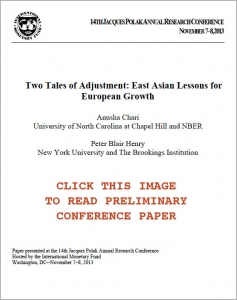 08 Nov 2013 — Today I have traveled to Washington D.C., where I am joining the IMF’s 14th Annual Research Conference already in progress. This year, the conference is focusing on the economics of crises, and I am pleased to be the coauthor of a paper that my colleague Anusha Chari will present: Two Tales of Adjustment: East Asian Lessons for European Growth. The paper focuses on the use of austerity in East Asia and in Europe, and concludes that the IMF, often derided as “It’s Mostly Fiscal,” may well stand instead for “It’s More Flexible” than you think—and than the European Union’s fiscal compact.
08 Nov 2013 — Today I have traveled to Washington D.C., where I am joining the IMF’s 14th Annual Research Conference already in progress. This year, the conference is focusing on the economics of crises, and I am pleased to be the coauthor of a paper that my colleague Anusha Chari will present: Two Tales of Adjustment: East Asian Lessons for European Growth. The paper focuses on the use of austerity in East Asia and in Europe, and concludes that the IMF, often derided as “It’s Mostly Fiscal,” may well stand instead for “It’s More Flexible” than you think—and than the European Union’s fiscal compact.
But the purpose of this year’s conference is also to honor Stanley Fischer, who has made innumerable important contributions to research and policy and who knows a thing or two about economic and financial crises. In addition, I am happy to say that he has been an important influence in my academic and intellectual life.
Among the many accomplishments that have piled up behind Stan’s name over the years—Head of the MIT Economics Department, First Deputy Managing Director of the IMF, Governor of the Bank of Israel, to name a few—the most significant to me is “dedicated teacher.”
Teachers matter. In the winter of 1994 at MIT, I experienced the privilege of taking my first graduate course in macroeconomics from Stan. Having then dared to hope that he might become my thesis advisor, I was crestfallen when the IMF whisked him away from MIT a few months later. Persistent (and perhaps foolhardy), in the fall of 1997—in the midst of the Asian Crisis and quite out of the blue—I sent Stan a chapter of my doctoral thesis that I was revising with the intent of sending it to a journal. It took a couple of hours to muster the courage to hit SEND, and I really didn’t even expect to hear back. But within a few days, I received a two-page reply with detailed comments and suggestions for improvement, which I took with gratitude. The paper was published and is still in many ways my most important article.
Today, Stan remains an important interlocutor, critic, and supporter. (He even had some kind words to say about my book TURNAROUND.) He is a dedicated teacher indeed, one to whom I am greatly indebted. I am pleased to participate with colleagues in this conference tribute to a remarkable man.
Thank you, Stan.